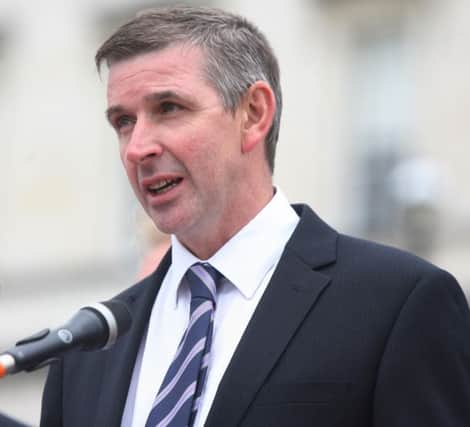Income figures a '˜body blow' to farmers, says UFU president


UFU president, Ian Marshall said the figures will come as no surprise to farmers struggling with the fallout for their businesses. But he said equal cause for concern was the fact that at this early stage in the year there was no evidence that 2016 would bring about the dramatic improvement needed.
The plunge in incomes was so great in 2015 that farm incomes were £53 million below what was received in Common Agricultural Policy payments. This meant farmers invested in their businesses and worked all year for less than they would have had for pocketing the CAP payment and doing nothing else.
Advertisement
Hide AdAdvertisement
Hide Ad“These grim income figures are a body blow for farming families – but they are also a body blow for the entire Northern Ireland economy. Almost £130 million was taken out of the rural economy. That is money that would have been spent locally, meaning towns and villages across Northern Ireland will have felt the impact of hard times hitting the farming community.” said Mr Marshall.
The UFU president said the figures underlined why they had fought so hard locally, in London and in Brussels for politicians, retailers, and the wider public to recognise the financial pressure on the farming industry.
“This moved the plight of farming up the political agenda – and we appreciate the support that came from the wider public, who took on board messages about the importance of local sourcing. All those we lobbied can now see that, if anything, things are even worse than we said. This certainly wasn’t a case of farmers crying wolf – this is a real financial crisis, and it is still there in 2016,” said Mr Marshall.
The UFU says the reasons for the price and income collapse are well understood. These include the weakness of the euro, loss of markets in Russia, supermarket price pressure and weak global markets.
Advertisement
Hide AdAdvertisement
Hide Ad“These are the explanations for what happened – but understanding a problem doesn’t make it go away, and it certainly won’t pay the bills farming families are facing,” said Mr Marshall, adding that it was a salutary thought that most farmers were now working for well below the minimum wage. This is a battle we will continue fighting on various fronts.
“Serious cash flow difficulties on farms is our immediate concern and with market volatility becoming an increasingly frequent and important issue for our industry it is essential that we not only look at the possible introduction of mitigation measures but also new ways in which our lending institutions deal with debt management on farms,” he said.
Agriculture Minister Michelle O’Neil re-affirmed her determination to continue working to help farmers as a fall in 2015 agricultural income is announced.
Commenting on the figures, the Minister, said: “Farmers have been hit significantly hard by low prices throughout last year and though it will come as no surprise that incomes have fallen in 2015, the extent of the reduction is concerning. The total income from farming figure for the industry as a whole is at a level not seen for 10 years and the farm level estimates show that while all sectors have suffered, it has been particularly difficult for dairy and pig farmers. Poor prices have been the major contributor to this downturn.
Advertisement
Hide AdAdvertisement
Hide Ad“Depressed markets have caused major difficulties for farmers. Direct CAP payments, which amounted to £236million last year act as a first line of defence in helping farmers through these difficult times, and the uncertainty around the future of these subsidies given a potential EU exit will further confound farmers’ fears. It was important that we hit our targets in terms of making as many of these payments as possible in December. To date, over 96% of payments have been made and we are prioritising the remainder.”
The Minister added: “However, although prices have been down globally due to production overtaking consumption, we have been doubly hit because of exchange rate effects and, therefore, the crisis in agricultural markets has been all the more devastating for our farmers. The EU Commission came under sustained pressure to act to help farmers and although the £5.1million Dairy Crisis Package which we secured was welcome, I believe the Commission needs to go further. That is why I have repeatedly pressed EU Commissioner Phil Hogan to review the EU market intervention system, and today’s figures graphically illustrate why that review is necessary immediately.
“Cash-flow is a continuing problem for farmers and I will continue to encourage banks and agricultural suppliers to be proactive, sympathetic and flexible on this issue. The Department’s advisers continue to work with farmers on cost control, technical efficiency and business management issues to help them deal with the current crisis.”
The Minister continued: “We also need to continue to work to improve efficiency and competitiveness and help build resilience in the longer term. This is why I am determined to get the best out of the new Rural Development Programme, which offers an opportunity to build a strong and resilient industry. I have also asked the Agri-Food Strategy Board to convene a Supply Chain Forum and bring together representatives from across the supply chain to ensure that those responsible for producing our high quality food are getting fair financial rewards for their work. Plans are well advanced for a second meeting of the Forum.”
Advertisement
Hide AdAdvertisement
Hide AdShe concluded: “We have also made good progress with opening up new markets in China, India and Canada and I will continue to prioritise this work. Given the continuing growth in world populations that brings increased demand for food, I remain optimistic about the long-term opportunities for our industry. However, the current income crisis requires that we continue to work on all fronts to help farmers and I re-affirm my commitment to doing just that.”